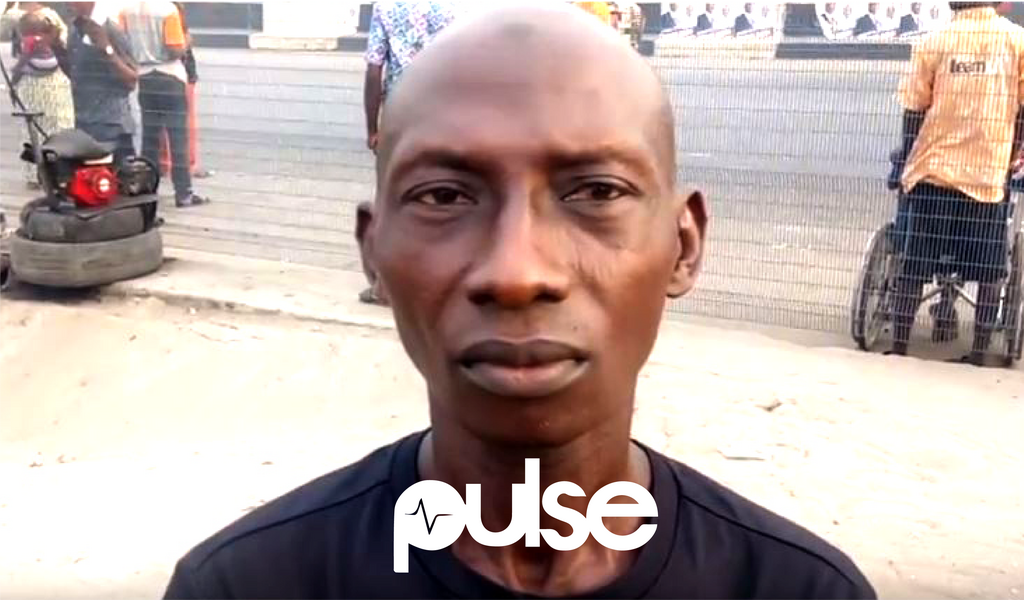There's a stereotype around agbèròs, it is of crass, uncultured and brash people who have no care for other people, but only care about themselves and how to defraud people.
While even the ones with good hearts and great character barely show it, either for occupational demands or stress, some still risk it all and show good traits to betray the stereotype.
The reason is simple, while they sometimes embody the stereotype for occupational demands, you just can't enclose the enviable traits of a good heart and emotive tendencies.

And that's the case of 27-year-old Babatunde Yusuf also known as Abija, an agbero at Estate Bus-stop, Oyingbo. Despite his limitations and his reasons to be cold at the world, he helps people.
He leaves his duty post, and helps students going to school early in the morning get on buses for free and while he expects nothing in return.

He helps the physically challenged people cross the really busy roads. But then, curves have edges, like his boss, Muja tells Pulse, "Abija is a good boy, but sometimes, we have to caution him."
That happens probably due to stress and a lack of sleep. Abija lives in Ajegunle with his wife and 10-month old kid, but gets to work at 4 am, after only getting home at 12 am. He says, "Wetin I go do? I get pikin."
As he told Pulse, Babatunde Yusuf was born in Lagos, but at one point, he moved to Ilorin, Kwara State, where his mother insisted he learned the ways of an Islamic Cleric (Alfa) - he did and his mother hoped he'd become a cleric.

On it, he says, "Nor be everybody wey learn Arabic go do Alfa."
Soon, he returned to Lagos, after completing his secondary education in Ilorin, Kwara State. After he was done, he needed a job.
His older brother, the original Abija who has since moved on to another career occupied the post he now occupies for the National Union of Road Transport Workers (NURTW) and he's since grown into the job. He calls it, "My own way."
When Pulse asks him if he realizes that some of these students are given money by their parents, Abija says, "Person wey send him pikin go school (From Estate Bus-stop) go Obalande nor go give am money? But I don't bother about the money, my own is to just assist."
He's now become famous to the students who now see him as support structure in the mornings, probably to save their parents some money or save some money for themselves.
Pulse spoke to one of those kids named Olamilekan and he confirmed that all the kids like and wait for Abija every morning. He also says Abija helps them even when the bus-stop is crowded.
On how he survives, Abija tells Pulse that upon delivering the mandatory N9,000 to his NURTW chapter, his take home is, "Three to four thousand naira, daily."
"If their papa give them money or e nor give them, that one nor be my problem. My concern is for them to get to school, so they will not be late," Abija says of his motive.
He continues, "My own is just do it to God."
When Pulse asks him what his dream is, he claims he does this job he's been doing for three years because he has no option, but he'd do another one that pays him.
This edition features special contribution from Pulse Money and Career Reporter, Akinbayo Wahab.
)
![Aisha blows hot on Security forces; Y7ou won't believe what she said [VIDEO]](https://image.api.sportal365.com/process/smp-images-production/pulse.ng/17082024/1f976edf-1ee2-4644-8ba1-7b52359e1a8f?operations=autocrop(640:427))
)
)
)
![Lagos state Governor, Babajide Sanwo-Olu visited the Infectious Disease Hospital in Yaba where the Coronavirus index patient is being managed. [Twitter/@jidesanwoolu]](https://image.api.sportal365.com/process/smp-images-production/pulse.ng/16082024/377b73a6-190e-4c77-b687-ca4cb1ee7489?operations=autocrop(236:157))
)
)
)
)
)
)
)
)
)
)
)